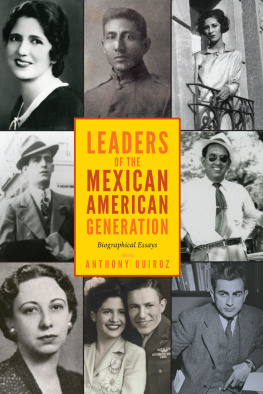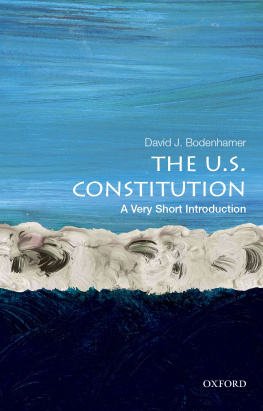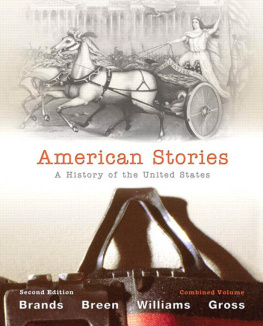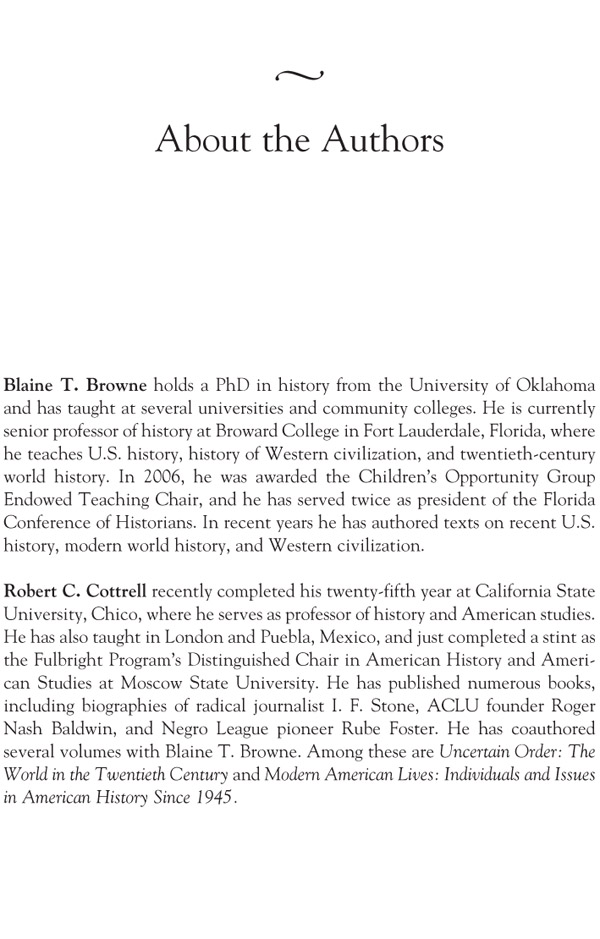CHAPTER ONE

A New Birth of Freedom Deferred
During the Civil War, President Abraham Lincoln demonstrated his rhetorical eloquence on numerous occasions, but perhaps none was as memorable as the dedication of the military cemetery at Gettysburg, Pennsylvania, on November 19, 1863, where he delivered a surprisingly brief address before a restless crowd. The president seized the occasion to present to a war-weary nation the deeper meaning of the terrible conflict, the cost of which had already reached into many American homes, both North and South. Lincoln reminded his audience of the historical purpose and promise of their nation, which, he proclaimed, had been conceived in liberty, and dedicated to the proposition that all men are created equal. Acknowledging the unfinished work that lay ahead, Lincoln spoke of the great task remaining before us... that this nation, under God, shall have a new birth of freedom. That last phrase, together with the presidents earlier reference to Jeffersons dictum about the equality of all men, hinted at a more inclusive definition of freedom, one that would encompass African Americans. Lincoln had already begun formulating policies for the reconstruction of those Confederate states occupied by federal forces, and the issue of the postwar status of freed slaves grew increasingly urgent. The president himself had only gradually begun to reconsider his previous beliefs about the unworkability of a biracial society and colonizing freed blacks abroad. Within his Gettysburg Address could be seen a glimmer of a more enlightened conception of race relations and the meaning of freedom. Though Lincoln would not live to see it, his own Republican Party would seek to realize this vision during the era of Reconstruction.
Congressional or Radical Reconstruction effectively began in early 1867 with the passage of the Military Reconstruction Act, which imposed military government on the former Confederate states. Under the protection of the U.S. Army, new Republican-led state governments took power with the broad support of recently enfranchised freedmen. Undertaking diverse political, social, and economic reforms, these Reconstruction governments initially gave promise of realizing Lincolns new birth of freedom, but such hopes dimmed after 1870, the year that the last former Confederate state was readmitted to the Union. The attentions of Congress and the Northern public to Southern affairs began to wane even as white southern Democrats began the process of Redemption, wresting political control of their states from Republicans. Any pretense of pursuing the idealistic vision of Congressional reconstruction ended with the Compromise of 1877, which resolved a disputed presidential election in favor of Republican Rutherford B. Hayes in return for his partys agreement to end Reconstruction. This marked the beginning of a new era that saw Lincolns lofty goals deferred for nearly a century. The Redeemers reestablished white supremacy in the South through black disfranchisement and a system of legal racial segregation marking the beginning of a nightmarish era for many African Americans. Choices were stark: one could submit to the dictates of white supremacy and all of its attendant humiliations, or one could challenge the system and run the very real risk of retaliation, which often meant impoverishment, physical injury, or death.
One of those who struggled to redeem his state from carpetbag government and to establish a white supremacist regime was South Carolinian Benjamin R. Tillman, who served two terms as governor and four terms as a U.S. senator. Known as Pitchfork Ben because of his championing of farmers, Governor Tillman built his political career on his defense of white supremacy and attacks on the aristocrats who profited at the expense of the working man. Renowned for the vulgarity and violence of his language, Tillman gained infamy as an advocate of lynch law, once proclaiming that he would willingly lead a mob in lynching a Negro who had committed an assault upon a white woman. As a freshman U.S. senator in 1895, Tillman brought his raw language to the Senate floor, where he drew huge galleries with his rhetorical crudities in defense of the Southern perspective on race. The South Carolinian was not alone in his views; he was one of a number of Southern demagogues who came to power in the post-Reconstruction period advocating white supremacy. Though some political figures and editors denounced the New South racists, beleaguered black Americans had no effective voice in the national political system and were left to their own devices.
These depressing circumstances posed major dilemmas for African Americans, especially those living in the Southern states where politicians such as Tillman seemed to encourage violence against blacks. Some saw logic in former slave Booker T. Washingtons perspectiveblacks should accommodate themselves to the realities of the New South and forgo pressing for civil rights in favor of hard work and productivity. Other African Americans saw only degradation and submission in Washingtons accommodationist outlook and concluded that racial injustices had to be confronted boldly. Ida B. Wells, born to a slave family in Mississippi in 1862, actively opposed white supremacy even as racists such as Ben Tillman were striving to institutionalize it. As a young adult, Wells personally challenged Jim Crow laws and turned her writing talents to journalistic use, attacking the myriad injustices endured by African Americans. Her greatest crusade was in opposition to lynching, which reached epidemic proportions in the 1890s. Torture, mutilation, and death through mob action was one of the most horrific means by which white supremacy was maintained, and Wells sought not only to awaken the nation to the extent of these horrendous crimes but to analyze the lynchers motives and expose the disingenuousness of the rationales offered by Tillman and other Southern demagogues. In an era in which some sought to ensure that African Americans should not experience a new birth of freedom, Wells struggled against great odds to see that vision fulfilled.

BENJAMIN R. TILLMAN

As soon as he had begun his maiden speech before the U.S. Senate on January 29, 1895, it was clear that South Carolina Democrat Benjamin Tillman intended to establish a reputation as an outspoken maverick who cared little for the traditions of decorum within that usually staid body; he was willing to employ any rhetorical excess in defense of his region, his state, and the working-class whites he professed to represent. His physical appearance, many contemporaries noted, reinforced the blunt impact of his words. One observer remarked that Tillman, who had lost one eye to an adolescent infection, had a face that would compel attention in any gathering of distinguished men, and another commented, Above this gigantic man there gleams the fiercest face ever seen on a public man. Known for a dramatic speaking style replete with violent gestures, contorted facial expressions, and exaggerated intonations, Tillman on this occasion stunned many in his own party with a withering assault on Democratic President Grover Cleveland, whom he had denounced during the previous years campaign as an old bag of beef. It was then that Tillman had vowed to go to Washington with a pitchfork and prod him in his old fat ribs. Now on the Senate floor, Pitchfork Ben proceeded to do just that, assailing the corpulent Cleveland as a hopelessly conservative Bourbon Democrat who conspired with the money-changers of Wall Street to reduce the nations working classes to a hopeless existence of toil year in and year out. Leveling such harsh allegations against a president from ones own party was deemed outrageous. Senatorial colleagues refused to offer Tillman the usual postspeech congratulations, and numerous newspapers denounced the South Carolinian in unequivocal terms. The New York Times dismissed Tillman as a filthy baboon, accidentally seated in the Senate chamber. The Springfield Republican was equally condemnatory, calling the senator a slangwhanging buffoon and demagogue. The Philadelphia Record described the South Carolinian as representative of the ignorance, intolerance and violence of the states mean white trash.













 BENJAMIN R. TILLMAN
BENJAMIN R. TILLMAN